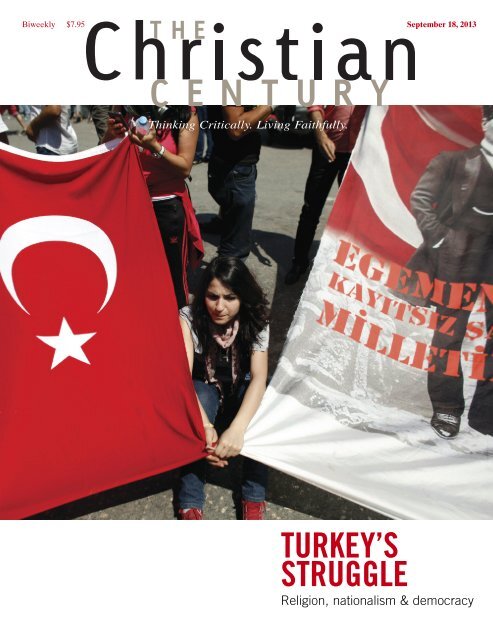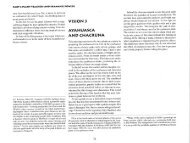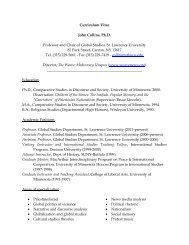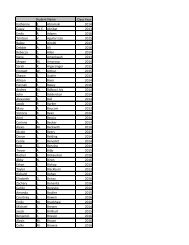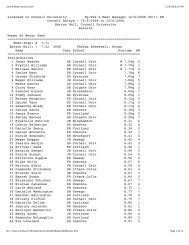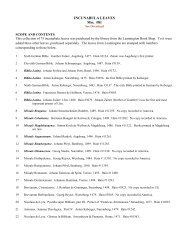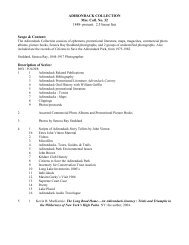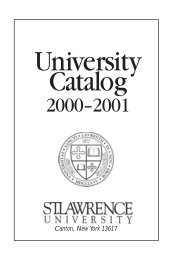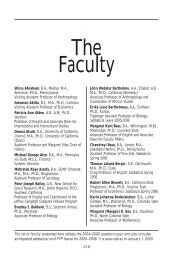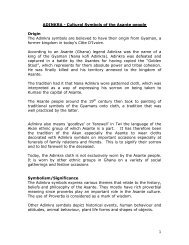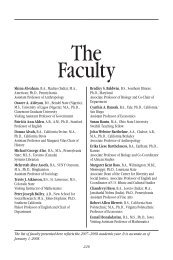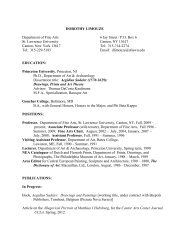The Christian Century - St. Lawrence University
The Christian Century - St. Lawrence University
The Christian Century - St. Lawrence University
You also want an ePaper? Increase the reach of your titles
YUMPU automatically turns print PDFs into web optimized ePapers that Google loves.
Biweekly $7.95 September 18, 2013<br />
Thinking Critically. Living Faithfully.<br />
TURKEY’S<br />
STRUGGLE<br />
Religion, nationalism & democracy
Turkey ’s season of struggle<br />
Unrest in Istanbul<br />
by Howard Eissenstat<br />
EVERYTHING SEEMED to be going so well in<br />
Turkey—until this past summer when popular protests broke<br />
out and were met by a violent government crackdown.<br />
<strong>The</strong> country is in many ways the Middle East’s success story.<br />
Under a charismatic leader, Recep Tayyip Erdoğan, the ruling<br />
Justice and Development Party (known by its Turkish initials<br />
as the AKP) has enjoyed a level of electoral success not seen<br />
in Turkey since the 1950s, and its political achievements have<br />
been remarkable.<br />
<strong>The</strong> AKP tamed the hyperinflation that haunted Turkey<br />
for decades, while managing a period of strong economic<br />
growth. Turkey has weathered the global economic slowdown<br />
better than most countries. <strong>The</strong> AKP also faced down<br />
Turkey’s arrogant military elite, forcing them out of political<br />
life and back into the barracks. It initiated an important<br />
series of liberalizing legal reforms and opened up greater<br />
avenues for expression of Kurdish cultural identity. While<br />
the government still engages in a massive public campaign<br />
against recognizing the Armenian genocide during World<br />
War I, discussion and even commemoration of the genocide<br />
is now commonplace, at least in some cities.<br />
Though the AKP’s efforts at asserting a greater role for<br />
Turkey internationally has had a number of serious setbacks—<br />
most notably its newly sour relations with Israel and its early<br />
resistance to NATO intervention in Libya—the overall trajectory<br />
has been positive. Turkish businesses have played a major<br />
role in rebuilding Iraq and are showing a willingness to venture<br />
further afield. Africa, for example, has become a new focus for<br />
Turkish diplomats and businesses.<br />
Under the Obama administration, U.S.-Turkish cooperation<br />
is probably as close as it has been at any time since the<br />
cold war. Obama and Erdoğan have a strong working relationship,<br />
which has only intensified since the beginning of<br />
the Arab uprisings in 2011. Turkey is arguably the most<br />
important American ally in addressing the crisis in Syria, for<br />
example, and Turkish cooperation with the United <strong>St</strong>ates on<br />
Iran seems to be considerably stronger than it was a few<br />
years ago.<br />
American officials have frequently spoken of Turkey as a<br />
democratic model for the Middle East. It is easy to see why.<br />
Turkey’s development is fueled not by oil but by a strong educational<br />
system and an aggressive market sector. Unlike the<br />
oil-driven wealth of much of the Middle East, Turkey enjoys a<br />
diverse and vibrant economy. And unlike most of the region, it<br />
is solidly democratic. <strong>The</strong> AKP clearly has Islamist roots, but<br />
the party believes that power comes from the ballot box, and it<br />
has been committed to working within secular institutions. In<br />
Turkey, where more than 99 percent of the people are officially<br />
listed by the state as Muslim, being a good Muslim does not<br />
mean calling for Islamic law.<br />
But the popular protests that began in June in Turkey reveal<br />
some of the deeper problems the country faces. <strong>The</strong> protests<br />
may have been sparked by attempts to demolish Gezi Park in<br />
Istanbul, but the deeper cause can be found in long-standing<br />
failures on the part of Erdoğan and the AKP. Religion plays a<br />
role in this unrest, but Islamism is not the core of what has<br />
gone wrong in Turkey.<br />
<strong>The</strong> AKP displays a kind of illiberalism that has marked<br />
Turkish political life since the modern state was founded<br />
in 1923. As Kerem Öktem has shown in Angry<br />
Nation, a history of modern Turkey, the violence of Turkish<br />
nationalism at the time the state was founded was retained in<br />
Erdogan’s party has exerted<br />
its will in almost every<br />
corner of Turkish society.<br />
efforts to create a hegemonic national culture. Ethnic, religious<br />
and cultural diversity have been regarded with disdain. <strong>The</strong><br />
AKP has amended this approach in small ways, but it remains<br />
a very strong feature of the ruling culture.<br />
As the AKP consolidated power, it became more traditionally<br />
“Turkish” in its rhetoric and tactics. It engaged in a particularly<br />
brutal crackdown on Kurdish nationalists until peace<br />
negotiations, now apparently running aground, were begun<br />
last year. While the AKP had once been willing to implement<br />
significant reforms in an effort to enter the European Union,<br />
by 2011 this process has been abandoned in all but name.<br />
Following EU criticism of this summer’s crackdown on protesters,<br />
Erdoğan’s response was matter-of-fact: “You [the EU]<br />
Howard Eissenstat teaches history at <strong>St</strong>. <strong>Lawrence</strong> <strong>University</strong>. He also serves<br />
as a Country Specialist on Turkey for Amnesty International USA.<br />
<strong>Christian</strong> <strong>Century</strong> September 18, 2013 22
Taksim Square, June 2013 (© Alan Hilditch)<br />
do not respect democracy.” Under the AKP, Turkey functions<br />
as a democratically elected single-party state.<br />
To be sure, Turkey enjoys regular, free, fair elections. But the<br />
AKP’s electoral success, buoyed by an electoral system that is<br />
specifically aimed at neutering minority (and particularly<br />
Kurdish) voices, has over the past decade rewarded it with<br />
unprecedented political success at virtually all levels of government.<br />
Moreover, because the role of local government is very<br />
weak compared to the central state, the AKP has been able to<br />
exert its will in almost every corner of Turkish society.<br />
Like any effective political machine, the AKP has capitalized<br />
on its electoral success by cementing its base, rewarding<br />
friends and cowing enemies. In this, it resembles the great<br />
urban political machines of mid-20th-century America, but<br />
with an important difference: it operates at a national level,<br />
and there is no outside force to counterbalance it. <strong>The</strong> Turkish<br />
military once held dangerous sway over Turkish politics, but its<br />
removal from political life, necessary as it was, did little to<br />
improve Turkey’s record on human rights.<br />
Over time, virtually every state bureaucracy, from the police<br />
to the postal service, has been filled with AKP allies.<br />
Businesses that are viewed as friendly to the AKP are rewarded<br />
with contracts and an easy path through government regulations.<br />
Businesses that are viewed as enemies are punished<br />
with obstruction, investigations and steep fines. Political enemies<br />
are hounded by the courts and by the press.<br />
A recent article by Yavuz Baydar in the New York Times<br />
noted that the collusion of big business and big government in<br />
Turkey has virtually eliminated serious reporting (“In Turkey,<br />
Media Bosses Are Undermining Democracy,” July 19). Any<br />
journalist brave enough to flout the bosses and report unpopular<br />
news will be sacked. (Baydar himself was fired from his position<br />
at the daily paper Sabah within days of his Times article.)<br />
And when that doesn’t work, there is always jail. Reporters<br />
Without Borders has termed Turkey “the world’s biggest prison<br />
for journalists” because of the large number of reporters who<br />
have been arrested under anti terrorism or other statutes.<br />
In following Turkish human rights issues over the years, I’ve<br />
often been struck by how little outrage outrageous state crimes<br />
can generate. <strong>The</strong> nation gave a collective shrug at the news<br />
that Turkish authorities had bombed unarmed Turkish civilians<br />
at Uludere in 2011. <strong>The</strong> harsh tactics that security forces utilized<br />
this past summer on protesters in Istanbul are longstanding<br />
and a nearly weekly event in some Kurdish towns in<br />
the eastern part of the country. Some Kurds, watching the Gezi<br />
crackdown, responded by saying, “Now you know what we’ve<br />
experienced for the last 30 years.”<br />
What made events at Gezi Park different was the way<br />
they crystalized larger issues for a wide coalition of<br />
actors. <strong>The</strong> government’s shockingly heavy-handed<br />
response to a handful of mostly middle-class nonviolent demonstrators<br />
provoked thousands—and eventually millions—of protesters<br />
to take to the streets.<br />
One important component of the protests is their critique of<br />
the AKP’s penchant for rapid and sometimes gratuitous expansion.<br />
Istanbul and much of Turkey has been transformed over<br />
the past decade. One can marvel at the economic vibrancy and<br />
commercial flare of the country’s development, but the cultural<br />
and social costs have been high. Long-established family businesses<br />
and historic sites have been pushed out to make space for<br />
shopping malls. Erdoğan seems to have acquired a taste for large<br />
projects aimed at cementing his legacy, even if it means bypassing<br />
normal systems of planning and consultation in the process.<br />
Erdoğan’s plans for Gezi Park and nearby Taksim Square<br />
are one example of that approach. It is for him a chance to<br />
make his mark on the center of Republican Istanbul.<br />
Gezi Park was built almost literally on the bones of an<br />
Armenian past. <strong>The</strong> park, like much of Taksim Square, was<br />
built over an Armenian cemetery that was expropriated after<br />
the creation of the Turkish Republic. Now it is one of the few<br />
remaining green spaces in the city and is viewed as the heart of<br />
secular Turkey. It is a place where residents of a vast and heterogeneous<br />
city can meet and mix with relatively little tension.<br />
Erdoğan’s vision of the new Taksim, which included a new<br />
mosque, a reconstructed Ottoman army barracks and a shopping<br />
mall, was seen by many Turks as a gratuitous attack on one<br />
of the last places where the AKP vision did not yet hold sway.<br />
23 <strong>Christian</strong> <strong>Century</strong> September 18, 2013
<strong>The</strong> miscalculation is a mark of Erdoğan’s increasing tone<br />
deafness. In many ways, Erdoğan is an attractive personality.<br />
His tough, brusque charisma is well received in a society that<br />
values strong-willed, patriarchal figures. Yet he can be intolerant<br />
and disdainful of criticism, and he seems to take unseemly<br />
pleasure in demonstrating the weakness of his opponents.<br />
<strong>The</strong> AKP shows an increased use of social engineering, as<br />
evidenced by new limitations on alcohol, attacks on reproductive<br />
rights and a campaign against public displays of affection.<br />
This agenda is not a sign of Islamism as it is generally understood<br />
in the West, however, for it includes no calls for enacting<br />
Islamic law. Erdoğan clearly believes in secular institutions.<br />
Rather, the moves roughly parallel those of social conservatives<br />
in the United <strong>St</strong>ates who seek to embrace secular institutions<br />
and infuse them with moral content colored by religion.<br />
Perhaps the most striking example of this effort is the AKP’s<br />
support for creationism, which is routinely taught in Turkish<br />
schools. <strong>The</strong> arguments, examples and illustrations are often<br />
directly borrowed from American creationist literature.<br />
One of the secrets of the AKP’s electoral success has been<br />
the seemingly unbridgeable divisions among the opposition.<br />
<strong>The</strong> crackdown on protesters at Gezi Park seemed to encapsulate<br />
common fears, and, at least for the moment, it brought that<br />
opposition together in a remarkable mass movement.<br />
Sonnet<br />
joyous G-d with a diphthong for a heart<br />
speaking guttural utterances<br />
and finding some soil to dig into<br />
calls man up like a whirlwind from the dust<br />
to name the animals and watch the rain<br />
from within the cleft of a sheltered plane<br />
like all reality entering in<br />
to a room at once even the windows<br />
are unable to stay shut and the grass<br />
all around bowing down in the breeze lies<br />
plastered to the ground laughing all the while<br />
“and what my love do you want to call this<br />
cloud of dust” a hippopotamus<br />
Adam says jokingly though the name sticks<br />
Anthony Opal<br />
<strong>The</strong> protests have in many respects highlighted the best<br />
in Turkish society. <strong>The</strong>y have been remarkably diverse,<br />
including members of the LGBT community, non-<br />
Muslims, secularists, militant nationalists, Kurdish nationalists,<br />
anticapitalists and liberals. <strong>The</strong>y have been remarkably creative,<br />
including tango dances with gas masks, silent protests<br />
and polite community forums. And, at least when the tear gas<br />
wasn’t too thick, they have been joyful. Most recently a group<br />
of anticapitalist Muslims organized massive communal dinners<br />
for breaking the fast of Ramadan.<br />
In contrast, Erdoğan’s response to the protests has demonstrated<br />
remarkably little flexibility. Erdoğan has showed disdain<br />
toward the protests, calling participants “bandits” and<br />
“hooligans.” He has termed Twitter “a social disease” for its<br />
role in helping protesters organize and chronicle abuses. He<br />
has called international critics “ill-informed” and hypocritical.<br />
Erdoğan sees the protests as fundamentally undemocratic,<br />
an attempt to take power in the streets when it could not be<br />
won at the ballot box. He remembers with bitterness that many<br />
of his critics had once counted on the military to oust him.<br />
Moreover, Erdoğan is without question the most popular<br />
politician in Turkey. Not only did his party win recent elections<br />
with an increasing percentage of the vote, but few doubt that<br />
he would win again if he called elections today.<br />
Turkey is a divided country, but Erdoğan has the unswerving<br />
support of nearly half of it, while the political opposition<br />
is hopelessly divided and largely incompetent. A survey of<br />
the protesters in Taksim Square in early June by researchers<br />
at Bilgi <strong>University</strong> indicated that only about 5 percent of<br />
those who participated viewed themselves as potentially supporting<br />
the AKP. National surveys indicate that AKP support<br />
has only dropped by about the same percentage despite the<br />
crisis and a declining economy. <strong>The</strong> AKP has clearly opted for<br />
a twofold response: rallying its base and cracking down on its<br />
opposition.<br />
Since the beginning of the crisis, Erdoğan has staged a series<br />
of massive public rallies. His rhetoric at these events has been<br />
decisively polemical, aimed not at healing wounds but at mobilizing<br />
his supporters. Violent attacks on protesters by AKP supporters<br />
have been reported in a number of places. Men armed<br />
with machetes and truncheons have been seen working alongside<br />
the police.<br />
<strong>The</strong> rhetoric has focused fury on the international media, on<br />
unnamed foreign powers and, sometimes subtly and sometimes<br />
openly, at “the Jews.” <strong>The</strong> last of these is particularly troubling<br />
because it represents a renewal of an anti-Semitism that<br />
Erdoğan’s generation had worked to marginalize in the late 1990s.<br />
His embrace of it now tells us that he is willing to feed the worst<br />
instincts of his base to cement support. It also tells us that he no<br />
longer is particularly concerned about what the West will say.<br />
This militant rhetorical response is coupled with a renewed<br />
attempt to centralize power and to neuter political opposition.<br />
Since the Gezi crisis began, the government has reworked legal<br />
language to further underline that the military has no role in<br />
politics and executed a purge of the foreign ministry to ensure<br />
that top positions are held by party loyalists. An urban planner<br />
who was a key figure in criticizing the original redevelopment<br />
plan has been transferred to a distant province. A large number<br />
of journalists have been fired from their positions for<br />
reporting on the news (or they resigned in disgust when they<br />
were prevented from doing so). Hundreds have been arrested<br />
in the aftermath of the protests, including many who were<br />
arrested on the basis of messages they sent via social media.<br />
In the short term, Erdoğan’s strategy will almost certainly<br />
win out. For all of its vibrancy, the Gezi protest movement<br />
shows little capacity to mobilize an effective political campaign.<br />
<strong>The</strong> opposition remains divided and, with the exception<br />
of some figures in the Kurdish BDP, unimpressive.<br />
<strong>Christian</strong> <strong>Century</strong> September 18, 2013 24
<strong>The</strong>re are, however, two important reasons for hope. <strong>The</strong><br />
first is that significant elements of the AKP are distinctly<br />
unhappy with Erdoğan’s handling of the protests. <strong>The</strong> most<br />
important counterweight to Erdoğan within the party is the<br />
powerful Gülen movement, which has made its discomfort<br />
with his handling of the crisis an open secret. It is noteworthy<br />
that Turkish president Abdullah Gül, who is close to the movement,<br />
has taken a markedly more liberal approach than<br />
Erdoğan in his response to the crisis.<br />
<strong>The</strong> Gülen movement is a religious and social movement<br />
led by Turkish Islamic scholar Fethullah Gülen. Gülenists constitute<br />
an important wing within the ruling AKP but have long<br />
been uneasy about Erdoğan’s aggressive style, even if they<br />
share his long-term vision of a Turkey that embraces both<br />
modern capitalism and Islam. Both the Gülenists and Erdoğan<br />
assume that devout Islamic faith and secular modern institutions<br />
can—and indeed must—coexist. <strong>The</strong>y also assume that<br />
Turkey should take a leading role in world affairs and serve as<br />
a bridge between civilizations.<br />
For the Gülenists, the violence of the crackdown and the<br />
crassness of Erdoğan’s attacks on the sensibilities of the opposition<br />
are simply bad strategy, which undermine the movement’s<br />
long-term objectives. In a statement regarding the<br />
protests, Gülen makes clear his disdain for the protesters, but he<br />
is equally clear that the government’s response was a clumsy<br />
one:<br />
We therefore need to be alert and act intelligently. We need<br />
to see the smallest problems as consequential, and we need<br />
to handle them in a smart way. If you are facing an invasion<br />
of ants, do not dismiss it. <strong>The</strong>y reach into your pots of butter<br />
and honey, and pollute them with toxins; do not dismiss<br />
it. Taking problems lightly stems from light thinking, light<br />
reasoning, and light judgment.<br />
It is not clear what compromise the two powerful wings of the<br />
AKP will eventually reach, but it is likely that Erdoğan will be<br />
pushed to reign in his instinct for confrontation.<br />
<strong>The</strong> second positive element can be seen in the public<br />
forums that have sprung up in Turkey since the crackdown.<br />
<strong>The</strong>se events, in which diversity of opinion is openly and publicly<br />
expressed, represent an important break from the<br />
depoliticized public of Turkey’s recent past, and their celebration<br />
of diverse opinions represents a significant departure from<br />
the old rhetoric of an undivided Turkish nation.<br />
A few weeks ago a friend of mine told me the story of a<br />
young, middle-class woman standing up at one of these forums<br />
and saying, “I just want to say to the Kurds here: I’m sorry. I didn’t<br />
know. Or perhaps I knew and didn’t care what you were experiencing.<br />
I could have done better. And I want to apologize now.”<br />
Empathy for the other and respect for diversity. If the Gezi<br />
protests have introduced those themes into Turkish political culture,<br />
then they have accomplished something great indeed.<br />
Second Presbyterian Church in <strong>St</strong>. Louis<br />
announces the 2013 Pfautch Lecture Series<br />
Exodus<br />
from Hunger:<br />
Called to End the Politics of Hunger<br />
October 14-15, 2013<br />
<strong>The</strong> Reverend David Beckmann<br />
World Food Prize Laureate<br />
President, Bread for the World<br />
“God is Moving in Our Time”<br />
Monday, October 14 | 7 pm<br />
“Changing the Politics of Hunger”<br />
Tuesday, October 15 | 7 pm<br />
www.secondchurch.net<br />
Free and open to the public<br />
25 <strong>Christian</strong> <strong>Century</strong> September 18, 2013


